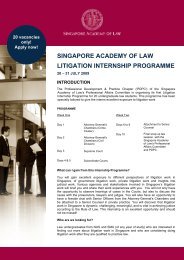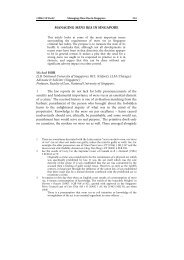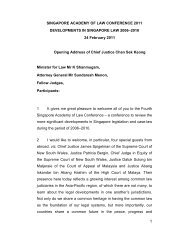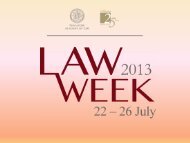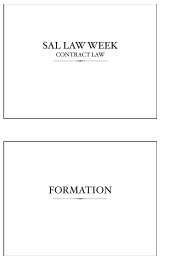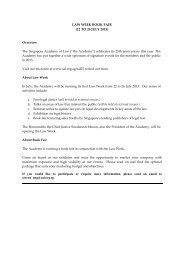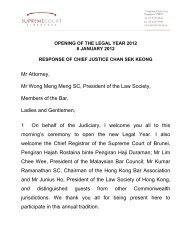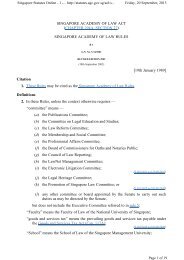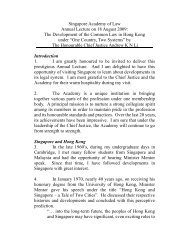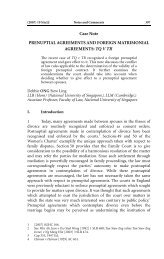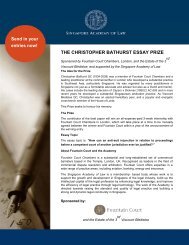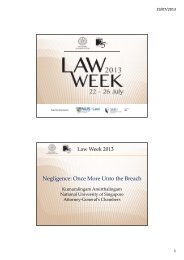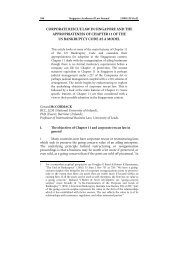View Article - Singapore Academy of Law
View Article - Singapore Academy of Law
View Article - Singapore Academy of Law
Create successful ePaper yourself
Turn your PDF publications into a flip-book with our unique Google optimized e-Paper software.
15 SAcLJ Matrimonial Assets and the 3 rd Party 269<br />
130 Alternatively, if the 3 rd party commences fresh proceedings<br />
against the original party on the same issues which were dealt with in the<br />
ancillary matters proceedings, and the original party seeks to re-open all<br />
the issues, rather than to abide by the findings made in the ancillary<br />
matters proceedings, the 3 rd party may not raise issue estoppel as a<br />
defence against the original party based on the judgment given in the<br />
ancillary matters proceedings. For example, if the court finds that the 3 rd<br />
party has loaned the sum <strong>of</strong> $50,000 to the husband to purchase the<br />
matrimonial home, and orders this sum to be repaid to the 3 rd party by<br />
the husband, and the husband refuses to pay the 3 rd party, the 3 rd party<br />
may then start proceedings against the husband to recover this sum. The<br />
husband will not be estopped by the judgment <strong>of</strong> the court in the<br />
ancillary matters from disputing the existence as well as the size <strong>of</strong> the<br />
debt.<br />
131 However, in both the scenarios set out above, any evidence<br />
tendered in the ancillary matters proceedings may also be tendered in the<br />
fresh proceedings in the ordinary civil court, and if there is any<br />
contradiction between the evidence given in the ancillary matters<br />
proceedings and the evidence given in the fresh proceedings, the<br />
appropriate adverse inferences may be drawn.<br />
4.7 In practice—for cases where 3 rd party is a non-party<br />
with or without notice<br />
132 In practice, however, it would seem that issues regarding the 3 rd<br />
party’s appeal rights and the question <strong>of</strong> issue estoppel seldom arise,<br />
notwithstanding that the 3 rd party is a non-party with or without notice <strong>of</strong><br />
the ancillary matters proceedings.<br />
133 It is submitted that this is because the 3 rd party would <strong>of</strong>ten be a<br />
friend or relative <strong>of</strong> either the husband or wife, and aligned to that party<br />
(“the original party the 3 rd party is aligned to”).<br />
134 If an order against the 3 rd party (who is a non-party to the<br />
ancillary matters proceedings) is given, the original party that the 3 rd<br />
party is aligned to, will usually be the one to appeal against that order.<br />
Thus, the question <strong>of</strong> whether the 3 rd party has the right to appeal against<br />
that order would normally not arise, nor would there be any future<br />
litigation started by the 3 rd party in the ordinary civil court in the matter.<br />
135 If an order in favour <strong>of</strong> the 3 rd party is given, the original party<br />
that the 3 rd party is NOT aligned to will appeal against the order, rather<br />
than start fresh proceedings in the matter. The party against whom that



